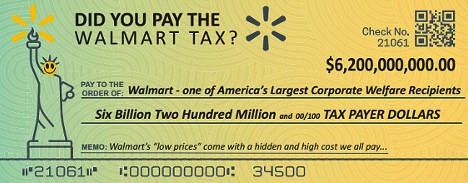
When all else fails, minimum wage opponents become fervently patriotic, because freedom is at stake. Shouldn’t a person have the right to work for any amount they are willing to accept? There is one little problem with that. If everyone believed it, we would never have had labor unions, and America would have never become the economic powerhouse that gives patriots something to wave the flag about.
A version of the red, white and blue sentiment was phrased by Michael Rathbone, former policy researcher at the Show-Me Institute:
If workers do not feel that they are being fairly compensated, they are free to look for employment elsewhere.
The trouble is, America is full of people fearfully hanging onto awful jobs. Hasn’t this guy ever heard of one-industry towns? If the catfish processing plant is the only local business, you work at the catfish plant, or else as a bartender, and there are only so many bartender jobs.
On the other hand, Garry Reed wrote in an article for Soapboxie.com:
It’s true that some people get stuck in low-paying jobs and can’t get unstuck through no immediate fault of their own… Maybe they dropped out of school, had a kid, had another kid, never learned to manage their money, did drugs, weren’t willing to leave family and friends and familiar surroundings to seek out a better life, so they took the first job they could get and turned it into a rut.
So, in other words, he’s saying it is their own fault. They quit school, didn’t learn how to balance a checkbook, started drinking, didn’t use contraception, or possess quaint old family values that require caring for elderly or disabled relatives. These people, according to Reed, are victims of their own bad choices.
In which case, expecting the government to make things better, by forcing employers to pay a minimum wage — and even increase it every now and then — is grossly unfair. Making businesses subsidize low-paid workers is “wrong” and constitutes an injustice.
The thing is, somebody is going to wind up subsidizing those low-paid workers who need food, medical attention, etc., and it’s going to be the taxpayers. Shouldn’t it be instead the businesses they work for?
But wait — Reed perceives even more injustice perpetrated upon employers who, after all, provide valuable training:
And in some cases the employer of a low-skilled part time worker just may be training someone who becomes a future competitor who out-works, out-performs and out-competes that former employer and runs him or her out of business.
Wait a minute. It seems like, in line with the writer’s own tough-love philosophy, if somebody does the job better than the company where they started out, that too should be accepted as a price of freedom and the marketplace!
This sentence written by James Dorn in a Forbes article is an example of one type of the mind-boggling statement that comes up in these discussions:
But if a worker is producing $5.15 per hour and now the employer must pay $9 per hour, there will be little incentive to retain her…
The verb “produce” is interesting. While it has yet to be proven that any Chief Executive Officer, anywhere on earth, even the head of Walmart, “produces” $9,000 per hour, it never occurs to any of these theorists that, just maybe, executive compensation should be cut.
Dorn writes:
Employers have more flexibility in the long run and will find ways to economize on the higher-priced labor.
By economizing, he’s talking about such strategies as holding back on raises for the more established, higher-paid employees. Well hey, how about economizing on the millions doled out to CEOs, rather than penalizing long-term employees?
Incidentally, arguing some aspect of the minimum wage debate, another Dorn sentence goes like this:
If one gets empirical results that go against the grain of long-held economic laws, one should be very wary of advocating policies based on those results.
What??? He’s not talking about legislation, but law in the sense of the law of gravity, the laws of nature; and it doesn’t even make any sense. If empirical results — otherwise known as reality — go against “long-held economic laws,” then maybe they weren’t laws in the first place. But this is an example of the kind of mumbo jumbo that surrounds minimum wage discussions.
In his 2013 OurFuture.org article, Richard Eskow looked at another objection:
There’s also their much-beloved fantasy of the minimum wage as “racist.” Seriously. It’s a dirty argument to make — but then, there’s a lot of money at stake.
He refers to a writer named Jonah Goldberg who asserted that the original promoters of the concept were racists who instituted minimum wage because it would harm black workers, saying, “The Wall Street Journal even calls an increased minimum wage ‘The Minority Youth Unemployment Act.’”
There is one very frightening potential consequence of minimum wage legislation that is even worse than the outsourcing of jobs to workers overseas: the probability that increasing numbers of jobs will be filled by robots. Twenty years ago, many people thought the idea that supermarkets could get along without cashiers was ridiculous. Now, grocery chains have installed self-checkout operations that not only eliminate cashier jobs, but turn customers into unpaid workers for the corporation.
Reactions?
Source: “The $22 (An Hour) Question,” ShowMeDaily.org, 03/31/13
Source: “There’s More to Minimum Wage Jobs Than Wages,” Soapboxie.com, 03/23/17
Source: “The Minimum Wage Delusion, And The Death Of Common Sense,” Forbes.com, 05/07/13
Source: “Real Faces of the Minimum Wage,” OurFuture.org, 04/21/13
Image: United Food and Commercial Workers Union


